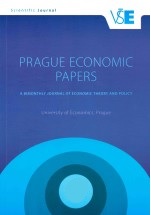Efficiency of Digital Economy in the Context of Sustainable Development: DEA-Tobit Approach
Efficiency of Digital Economy in the Context of Sustainable Development: DEA-Tobit Approach
Author(s): Viktorija Skvarciany, Indrė Lapinskaitė, Viktorija StasytytėSubject(s): Economic policy, Economic development, EU-Accession / EU-DEvelopment, ICT Information and Communications Technologies
Published by: Vysoká škola ekonomická v Praze
Keywords: digital economy; sustainable development; data envelopment analysis;
Summary/Abstract: The paper aims at measuring the efficiency of the digital economy in EU countries. For that purpose, data envelopment analysis (DEA) is used. Sub-dimensions of the Digital Economy and Society Index (DESI) are used as inputs and the Sustainable Development Goals Index (SDGI) as an output. The results revealed that Bulgaria, Italy and Romania are the most efficient digital economies in terms of human capital; Belgium, Bulgaria, Cyprus, Croatia, Estonia, Finland, Greece, Lithuania, Poland and Portugal in terms of connectivity; Bulgaria, Hungary and Romania in terms of integration of digital technology; and Romania in terms of digital public services. The result of tobit regression analysis showed that not all the indicators of the DESI dimensions positively influence the efficiency of the digital economy.
Journal: Prague Economic Papers
- Issue Year: 32/2023
- Issue No: 2
- Page Range: 129-158
- Page Count: 30
- Language: English

